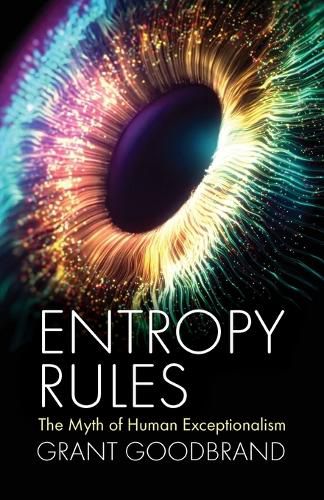Readings Newsletter
Become a Readings Member to make your shopping experience even easier.
Sign in or sign up for free!
You’re not far away from qualifying for FREE standard shipping within Australia
You’ve qualified for FREE standard shipping within Australia
The cart is loading…






This title is printed to order. This book may have been self-published. If so, we cannot guarantee the quality of the content. In the main most books will have gone through the editing process however some may not. We therefore suggest that you be aware of this before ordering this book. If in doubt check either the author or publisher’s details as we are unable to accept any returns unless they are faulty. Please contact us if you have any questions.
Must we destroy more than we create?
Human exceptionalism is our conviction that we are not solely governed by natural laws. Our exceptionalism gives the universe meaning and it makes us superior to everything. This is a myth. We are trapped believing there is a radical break between nature and us. We have subjectively constructed an unreal world in our relationships, institutions, and belief systems.
The real story is not human-centered. Science alone allows us to see ourselves from the outside, particularly through the law of entropy. This second law of thermodynamics prescribes the breakdown of organized particles into random ones that can never again be gathered into complex matter. We exist to participate in this mandate as part of the arc of the cosmos. We resist entropy but fail. This physical process underlies the conflicts within our species and social organizations as we try to amass matter but inevitably burn through it; create order and destroy it.
How can we make ourselves safe in this world? Will we create a new species? In Entropy Rules, retired psychotherapist Grant Goodbrand - with over fifty years of experience helping individuals find personal meaning- explores how the laws of physics underlie our personal meanings and the values our species imposes. This offers us within the limits of natural law ameliorating alternatives to our destructive activities.
$9.00 standard shipping within Australia
FREE standard shipping within Australia for orders over $100.00
Express & International shipping calculated at checkout
This title is printed to order. This book may have been self-published. If so, we cannot guarantee the quality of the content. In the main most books will have gone through the editing process however some may not. We therefore suggest that you be aware of this before ordering this book. If in doubt check either the author or publisher’s details as we are unable to accept any returns unless they are faulty. Please contact us if you have any questions.
Must we destroy more than we create?
Human exceptionalism is our conviction that we are not solely governed by natural laws. Our exceptionalism gives the universe meaning and it makes us superior to everything. This is a myth. We are trapped believing there is a radical break between nature and us. We have subjectively constructed an unreal world in our relationships, institutions, and belief systems.
The real story is not human-centered. Science alone allows us to see ourselves from the outside, particularly through the law of entropy. This second law of thermodynamics prescribes the breakdown of organized particles into random ones that can never again be gathered into complex matter. We exist to participate in this mandate as part of the arc of the cosmos. We resist entropy but fail. This physical process underlies the conflicts within our species and social organizations as we try to amass matter but inevitably burn through it; create order and destroy it.
How can we make ourselves safe in this world? Will we create a new species? In Entropy Rules, retired psychotherapist Grant Goodbrand - with over fifty years of experience helping individuals find personal meaning- explores how the laws of physics underlie our personal meanings and the values our species imposes. This offers us within the limits of natural law ameliorating alternatives to our destructive activities.